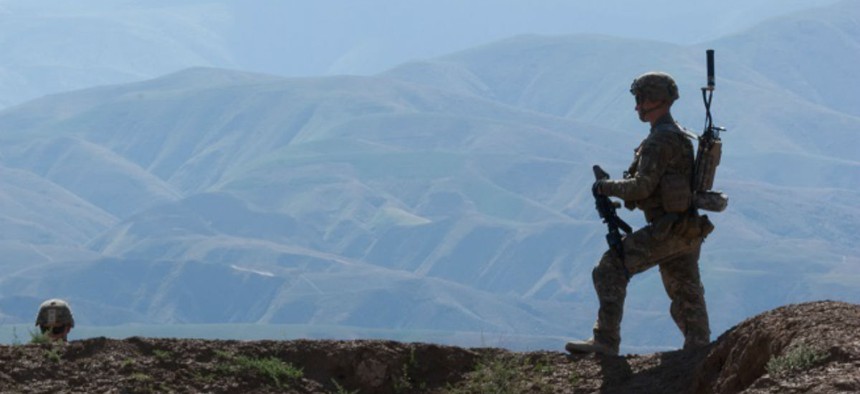
Soldiers from Blackfoot Troop, 6th Squadron, 4th Cavalry Regiment patrol outside their forward operating base in 2013. U.S. Army file photo by Blackfoot Troop
Watchdogs Differ on U.S. Troops’ Handling of Afghan Child Sex Abuse
IGs for Pentagon and Afghanistan reconstruction took different approaches to a serious problem.
It takes an array of inspectors general offices to monitor the U.S. efforts to pacify and rebuild war-torn Afghanistan. So it’s not surprising that differing audits are produced by the watchdogs at the State Department, USAID, the Pentagon and the Special Inspector General for Afghanistan Reconstruction.
This month, the Defense Department IG released a report on the effectiveness of U.S. troops in avoiding enabling the common and ancient problem of Afghan military service members’ sexual abuse of Afghan boys. It came just after a Government Accountability Office report saying the Pentagon watchdog and SIGAR need to better document and clarify their roles in Afghanistan to reduce duplication. And on Sunday, The Washington Post reported a story—the gist confirmed by Government Executive—that the Pentagon was keeping wraps on an earlier SIGAR report on the same sex abuse issue, allegedly because it is tougher than the one from the Defense IG.
The obligations of U.S. forces toward Afghan sex abuse victims stem from a 2014 amendment by Sen. Patrick Leahy, D-Vt., to existing human rights laws. Reacting to news reports of child sexual abuse, it specified that no funds available to the Defense Department “may be used for any training, equipment, or other assistance for a unit of a foreign security force if the Secretary of Defense has credible information that the unit has committed a gross violation of human rights.”
The Pentagon watchdog set out to inventory the laws, regulations, directives and training programs U.S. troops are subject to should they witness such abuse while on duty in the violence-wracked country. “We identify in this report the laws that discouraged DoD-affiliated personnel from reporting incidents of child sexual abuse,” the IG noted. “In some cases, personnel we interviewed explained that they, or someone whom they knew, were told informally that nothing could be done about child sexual abuse because of Afghanistan’s status as a sovereign nation, that it was not a priority issue for the command, or that it was best to let the local police handle it.”
The Defense IG determined that no training in handling such issues occurred among U.S. troops until September 2015, when a slide show was circulated by the U.S. forces’ staff judge advocate. Though the training stressed cultural awareness and combatting trafficking, it did “not specifically instruct U.S. personnel to report allegations of child sexual abuse.” From 2010 and 2016, the IG identified 16 allegations of child sexual abuse involving Afghan government officials reported by the Defense Department and the government of the Islamic Republic of Afghanistan.
“Under the DoD Law of War Program, and consistent with bilateral and international agreements governing U.S. operations in Afghanistan,” the report continued, “U.S. Forces who observe a member of the [Afghan security forces] sexually abusing a child are not prohibited from intervening and using reasonable force as may be necessary to prevent or stop such sexual abuse. However, U.S. Forces are under no obligation to intervene.”
The IG recommended that the Pentagon establish clearer procedures and identify one office with responsibility for the problem; Defense managers largely agreed.
SIGAR’s report on the subject, which has not been released, was requested by 93 members of Congress, in part because of SIGAR’s reputation for independent and blunt auditing, the Post reported. Pentagon officials reportedly dragged their feet on cooperating with SIGAR on the report and characterized the subject as beyond SIGAR’s mission scope. Leahy, through his staff, expressed concern that Pentagon officials are less than transparent about such topics. “It doesn’t seem [the Pentagon] is treating this with the urgency they should,” Leahy said. “It has already taken too long.”
John Sopko, the special inspector general for Afghanistan reconstruction, told the Post, “In reviewing the DoD IG’s report, it’s clear that SIGAR’s report paints a much fuller picture of the issue. It’s information I believe the American people have a right to know.”
A Defense Department IG spokeswoman said she had no evidence her team did not cooperate with SIGAR.
At least one transparency group picked up the issue. “At a time when we are focused on ending sexual harassment and abuse at home, we should know if we are aiding and abetting it abroad,” said Open the Government’s Executive Director Lisa Rosenberg. “Releasing SIGAR’s report is an important step towards openness and transparency that we strongly urge the Pentagon to take.”
The DOD IG since 2013 has been designated the “lead” inspector general for overseas contingency operations, GAO noted, with responsibility for reviewing all agencies’ information—which can lead to overlapping responsibilities.
SIGAR and the other IGs have established “coordination mechanisms to help prevent duplication,” GAO wrote, and a review of 137 reports from all four IGs in 2015 and 2016 found no duplication.
“However, SIGAR and DoD IG, as the lead IG, have not documented their agreed-upon roles and responsibilities for obtaining data from agencies and other OIGs used to prepare their mandated reports,” GAO said. “According to GAO's leading practices for effective interagency collaboration, documenting significant items that affect collaborative agreements could enhance coordination and strengthen the commitment to working collaboratively.”
The IGs agreed with GAO’s recommendations for improving documentation of their efforts to coordinate.







